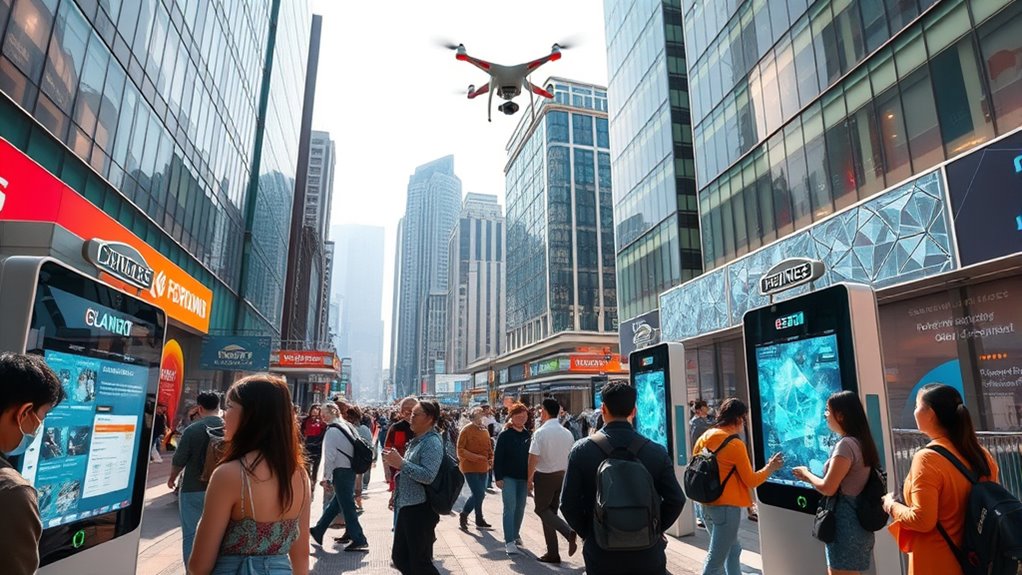Hong Kong is set to modernize 200 public services by 2027 through AI integration. You’ll see AI handling routine tasks like data analysis, customer support, and licensing to boost efficiency and transparency. The government has established an AI Supercomputing Centre and allocated funding to support innovation and cybersecurity. With responsible regulation and regional collaborations, Hong Kong aims to become a leading AI hub. If you want to discover how these changes might impact you, there’s more to learn ahead.
Key Takeaways
- Hong Kong aims to integrate AI into 200 public procedures by 2027, improving efficiency and transparency.
- AI implementation covers data analysis, customer service, and licensing processes across government departments.
- The government has established an AI Supercomputing Centre and allocated HK$3 billion to support AI R&D and deployment.
- Responsible AI use is guided by a regulatory framework focusing on ethics, privacy, and data security.
- Cross-border collaborations and regional initiatives position Hong Kong as a leading AI innovation hub.

Hong Kong is taking significant steps to modernize its public services by integrating artificial intelligence across 200 administrative procedures by the end of 2027. This ambitious plan aims to streamline operations, reduce delays, and improve overall efficiency in government services. By 2026, about half of these procedures will already have AI implemented, focusing on key areas like data analysis, customer service, and license or permit approvals. You’ll find that AI tools are designed to handle routine, repetitive tasks, freeing up resources and accelerating decision-making processes. This shift isn’t just about technology; it’s about creating a more responsive and accessible government. The government also formed a high-level AI Efficacy Enhancement Team to oversee strategy development and implementation, ensuring that AI integration aligns with broader policy goals. They want AI to be a core part of public service operations, supporting not only efficiency but also transparency, data security, and ethical standards. As part of this effort, AI is being promoted as a crucial industry, encouraging cross-sector collaboration and attracting global talent and data flows. You might notice new generative AI tools being piloted for citizen communication and internal knowledge management, helping staff respond faster and more accurately to public inquiries. These tools can also support policy development by analyzing large datasets, identifying trends, and providing insights that inform decision-making. One example is HKPilot, an AI assistant developed by the Hong Kong Government AI Initiative, which has been supporting document drafting, translation, and summarization tasks since mid-2024. Nearly all ongoing digital government initiatives from 2024 to 2025 involve AI and big data analytics, reflecting the government’s commitment to leveraging advanced technology. Infrastructure investments back these efforts, like the AI Supercomputing Centre at Cyberport, operational since late 2024, which provides the computational power needed for AI research and deployment. Additionally, the increasing focus on color accuracy in public service digital tools is essential for ensuring effective communication and information delivery. The government has allocated HK$3 billion (~US$385 million) over three years for an AI Subsidy Scheme to support local AI R&D, innovation, and cybersecurity efforts. This funding helps local institutions, startups, and government departments adopt AI solutions and develop new applications. Additionally, the government is establishing an AI regulatory framework to ensure responsible AI use and address potential risks. Meanwhile, policies are evolving to guarantee responsible AI use. The government has issued guidelines on personal data protection related to AI and is focusing on ethics, privacy, and transparency, even though Hong Kong has not adopted EU-style legislation. Regulators, including financial authorities and the legal sector, actively promote AI adoption to enhance risk monitoring and ensure responsible practices. Cross-border collaborations, especially within the Greater Bay Area, are fostering AI innovation through initiatives like the Hetao Shenzhen-Hong Kong Science and Technology Co-operation Zone. These efforts aim to create a regional hub for AI startups, infrastructure, and cross-boundary data management, positioning Hong Kong as a leading regional AI and tech innovation center.
Frequently Asked Questions
How Will AI Ensure Data Privacy for Citizens?
AI guarantees your data privacy by implementing strict controls like data minimization, encryption, and secure storage, so your personal information is protected. It maintains transparency through clear documentation and audit trails, and offers you control with consent mechanisms and rights to access, correct, or delete your data. Regular risk assessments and compliance checks ensure AI systems follow privacy laws, safeguarding your rights while allowing efficient public service delivery.
What Measures Are in Place to Prevent AI Bias?
You can trust that Hong Kong has strict measures to prevent AI bias. They scrutinize training data to spot biases, use techniques like re-weighting inputs, and continuously evaluate models. Human-in-the-loop controls are in place for high-impact applications, and independent oversight monitors AI systems regularly. Transparent decision-making and data governance guarantee accountability, while public education efforts help foster understanding and trust in ethical AI use.
Will AI Replace Human Government Staff Entirely?
You might wonder if AI will replace human government staff entirely. The truth is, AI acts as a tool—like a compass guiding you, not a replacement for your skills. Supportive rather than substitutive, AI handles routine tasks, freeing you to focus on complex decisions and human connections. The government’s approach emphasizes collaboration, training, and oversight, ensuring your expertise remains essential while AI enhances your work, not replaces it.
How Will Public Feedback Influence AI System Development?
Public feedback shapes AI system development by helping you identify gaps, biases, and usability issues. Your input guides developers to align AI functionalities with community needs, ensuring transparency and fairness. When you share your experiences and concerns, you’re actively improving system performance, addressing ethical considerations, and enhancing trust. Continuous feedback allows for adaptive updates, making AI tools more reliable, responsible, and better suited to serve your interests effectively.
What Is the Timeline for Full AI Implementation?
You can expect full AI implementation across at least 200 public services by the end of 2027. The plan includes deploying AI tools for data analysis, customer service, and license approvals by 2026, with gradual expansion. The government is actively establishing teams and funding initiatives, so you’ll see ongoing improvements and increased efficiency in public services as AI moves from pilot programs to full operation over the next few years.
Conclusion
As Hong Kong embraces AI to modernize its public services, you’ll find the city transforming like a well-oiled machine, smooth and efficient. This innovation promises faster, smarter solutions that make your daily interactions easier and more seamless. With AI guiding the way, you’ll experience a future where public services are as accessible as a morning breeze—clear, fresh, and always improving. Get ready to enjoy a city that’s smarter, better, and more connected than ever before.









